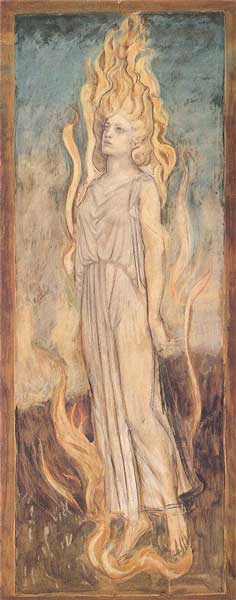Thargelia is a Spring Festival which honours Delian Apollon, as the Great Purifier, and also honours Artemis and Demeter. The first fruits of the earth are offered to the God in token of thankfulness, preceded by a purification ritual. In the Athenian Calendar, the festival was celebrated during the month of Thargelion which generally falls around May. The seventh day of every month was sacred to Apollon, who is known as Aevdomayaensis (born on the seventh day) with the 6th being sacred to Artemis, as Artemis was said to have been born the day before her twin brother Apollon, and 6th and 7th of Thargelion were celebrated as the birthdays of Artemis and Apollon respectively.
The name Thargelia has been translated as “first loaf” or “pot of grain”. Jane Harrison, in Prolegomena to the Study of Greek Religion (p. 78), says :
“about the meaning of the word Thargelia there is happily not the slightest doubt. Athenaeus quotes a statement made by Krates, a writer of about the middle of the 2nd Century B.C. in his book on the Attic dialect as follows: “the thargelos is the first loaf made after the carrying home of the harvest”. Now a loaf of bread is not a very primitive affair, but happily, Hesychius records an earlier or at least more rudimentary form of nourishment: Thargelos he says, is a pot full of seeds. From Athenaeusagain we learn that the cake called thargelos was sometimes also called thalusios. The Thalusia, the festival of the first-fruits of Demeter, is familiar to us from the lovely pictures the Seventh Idyll of Theocrites.”
The Thargelia therefore was likely to have been a festival celebrating the first fruits of the harvest, where Demeter was also honoured, as well as being a purificatory festival and celebration of the Yaenethlia of Apollon. In the UK, the grain is not ripe at this time of year, but some vegetables may be harvested in May. Fields of oil seed rape are in bloom, bees are busy collecting their nectar, and the gifts of Demeter can be seen all-around. A loaf of bread (don’t use the same dough that you used for the Pharmakoi if you have put negative thoughts into it) may be made and offered, or dish of sweetened boiled barley with fruit and nuts.
In modern times, in the Orphic tradition, using the Orphic Zodiacal calendar, the 21st May is celebrated as the birthday (Yaenethlia) of Apollon. it is the date we enter the Zodiacal month of Didymi, or Gemini, which in the Orphic tradition is ruled by Apollon. The birthday (Yaenaethlia) of Artemis is therefore celebrated on 20th May. A festival to honour the birthday of a God is called an Aepivatrion, and so the Aepivatrion of Artemis is 20th May, and the Aepivatrion of Apollon is 21st May. Prior to celebration of the Aepivatrion of Artemis, the purification of the Polis was carried out, beginning with sacrifices to Demeter Chloe, and two people, generally one male and one female (though the exact nature of the ritual, the people chosen and what was done to them change dover the years), were chosen as a kind of scapegoat sacrifice, called Pharmakoi. These two people, were fed at public expense and treated well until the day of the purification ritual, when they were either killed as ritual sacrifices (in earliest times) or beaten and or driven outside the boundaries of the Polis, taking the miasma and sins of the Polis with them. In modern times we don’t of course use human sacrifices, but the Pharmakoi can be represented by bread people or biscuit/gingerbread people. These scapegoats can be thought to carry all our faults, follies and miasma that we have accumulated over the year, and rather than purifying the Polis, we purify ourselves and our household (Oikos). Kneading the dough when making the images can be a very effective way of putting one’s negative energy into it, as you are pummelling it and beating it. A chant of some kind as you are kneading can help focus. I use something like:
As I mix this blessed dough
All negativities into it go
Absorbing all my anger, hate
Faults, transgressions, sins abate
Emotional, mental, spiritual affray
And physical illness I send away
Go into these Pharmakoi
This sacrificial girl and boy.
I give you my….
I give you my …
I give you my …
Yaenito! Yaenito! Yaenito!
The dough is then formed into one male and one female figure, and baked. A ritual may then be performed on the 19th May, whereby the Pharmakoi are anointed with olive oil, given offerings of food and wine, in a meal you share with them, and then removed from the home and burned or cast into a river. Do not eat them! prior to casting them out, you may take them to the boundaries of your property and instruct them to leave your Oikos forever, taking al miasma with them. I walk round carrying them saying something like “I have walked with you, I have lived with you, I have feasted with you, now go, leave me and my home forever”.

Before the Pharmakoi ritual, make offerings and prayers to Demeter.
On 20th May offerings to Artemis are made and prayers to her are recited. As well as using the Orphic Hymns, you could write Her a birthday poem or prayer celebrating her birth.
On 21st May offerings and prayers are made to Delian Apollon. The Orphic Hymn to Apollon, and the Homeric Hymn to Delian Apollon, which tells of His birth, may be read. Purificatory meditations may be practised, and artwork or songs offered.






